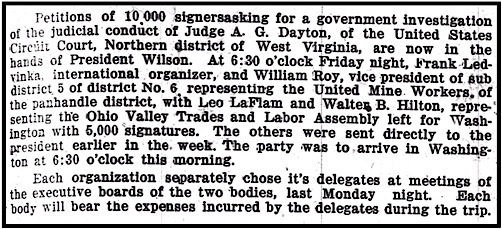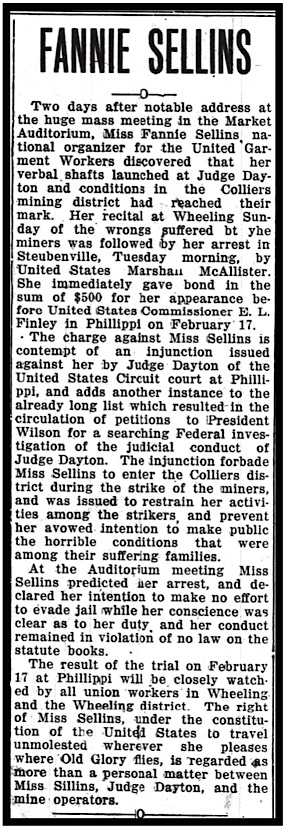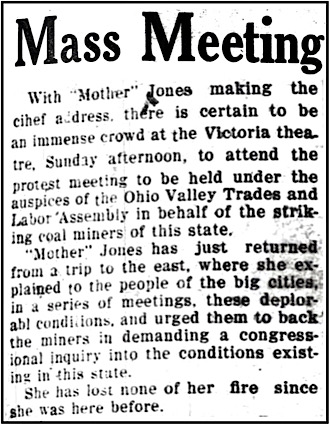 —————
—————
Hellraisers Journal – Friday February 13, 1914
Mass Protest Meeting at Wheeling Followed by Arrest of Fannie Sellins
From The Wheeling Majority of February 12, 1914:
By a grand jury of more than 3,000 talesmen, Federal Judge A. G. Dayton, of the United States Circuit Court, Northern District of West Virginia was indicted for misuse of the power of the injunction, and high crimes and misdemeanors against labor and the citizens of the State, at the huge mass meeting in the Market Auditorium, last Sunday afternoon [February 8th]. Public opinion appeared as the prosecutor; and witnesses were examined whose testimony revealed Judge Dayton as a Twentieth Century Judge Jeffrys, and his judicial methods as those of a Star Chamber court.
Judge Dayton entered no defense. He waived examination entirely, holding himself above the power that placed him in office. The verdict of the grand jury was unanimous, and only one ballot was taken. As a result of the action of the mass meeting, his conduct will be brought to the attention of President Wilson, Chief Magistrate of the United States. An official investigation of his unlawful practices in office will be prayed for, together with relief from the intolerable tyranny of his administration through removal from office.
Oppression of Helpless
Tears came involuntarily to the eyes of auditors as witness after witness recounted the oppression of the helpless miners at Colliers and elsewhere, and the misery and suffering engendered through Judges Dayton’s overriding of the laws of the land. Tears and horror were succeeded by anger and a determination to end the reign of injustice in West Virginia by the recountal of the betrayal of citizens of the State by a judge whose sworn duty it is to redress their wrongs, and to see that the violations of the laws of the United States are punished.
[The article continues at length with descriptions of the many speeches made, including that of Fannie Sellins whose speech was described thus:]
Fannie Sellins
Perhaps the most dramatic and stirring moments of the meeting came when Miss Fannie Sellins began a personal recital of the wrongs she had witnessed and encountered in the Colliers district during the strike. Without any attempt at oratory,—her sentences at times disconnected, her voice now hoarse with righteous anger, now tremulous to the verge of tears, she held the entire assembly breathless for nearly three quarters of an hour.
Audience In Tears
Hundreds in the audience were in tears when she told of hardships endured by miners and their families on the barren hillsides; of families huddled together beneath rags to keep themselves warm; of twin babies born without attention of any kind, either medical or otherwise in just such conditions.
She rehearsed incidents that happened to families of miners who had been brought to the district through misrepresentation,—who were told that there was no trouble, and of cruelties practised on them because they refused to work under those conditions.
She told of assaults without redress, of eviction from homes under unspeakable brutalities; of shots fired by assassins on men peacefully asleep in tents at night.
She recounted the stories of many assaults on pickets by Baldwin thugs,—called by the operators, mine guards. She told of insults offered to women and children; of an attempt to bribe a Polish boy to murder a union man.
She told of nights of horror when unheralded out of the darkness shots would sweep the camps in which were sleeping women and children from the hillsides where the guards were.
Appeals Are Vain
She told of frequent and vain appeals to the courts for justice, and of its refusal by Judge Dayton.
She told of her seizure on entering the district from Pittsburgh, and of threats of personal violence made to her by “Bob” Virgin, superintendent of the Pittsburgh Coal company, and miners.
Wave after wave of feeling swept over the hearers as with unstudied eloquence Miss Sellins told incident after incident, piled tales of hardship upon hardship, and of the vain endeavor to get justice from the courts.
The audience rose en masse and cheered her at the conclusion of her effort.
[…..]
[Emphasis added.]




 —————
—————